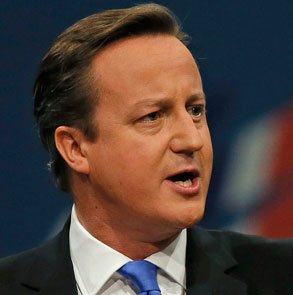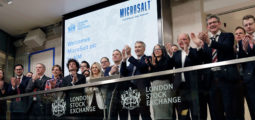British Referenda and Europe: Patience Is a Conquering Virtue

David Cameron
Afflicted by a veritable referendum craze, Britain seems set to question its very existence. In the wake of a stunning victory at the polls, the Scottish National Party (SNP) is looking to exploit its near-monopoly on politics north of The Border – the line running for 154km between Marshall Meadows Bay in the east and the Solway Firth in the west as established in 1237 by the Treaty of York and now again separating two diametrically opposed camps.
On Monday, SNP leader Nicola Sturgeon – surprisingly popular throughout the United Kingdom and widely celebrated as a welcome respite from her curmudgeon-like predecessor Alex Salmond – reminded Prime-Minister David Cameron that political realities have changed. She warned him not to rule out a second referendum on Scottish independence. Mrs Sturgeon appeared unimpressed by the prime-minister’s promise to heap additional powers on the devolved government in Edinburgh.
The SNP now wishes to move even beyond the proposed devo-max solution that awards the Scottish government full fiscal autonomy. The party suggests a loose federation is perhaps better suited to answer the aspirations of the Scots.
“As the election results have shown, Prime-Minister Cameron is singularly well versed in safely navigating political minefields.”
Though Mr Cameron’s Tories caught most pundits off guard, expertly tricked pollsters, and left all but a few talking heads speechless; the prime-minister’s position at the head of the first all-Tory government in almost twenty years is everything but comfortable. Not only must he calm the buoyant spirits of emboldened Scottish nationalists, Mr Cameron also has to fend off his own party’s more radical backbenchers who are more likely to take their cue from Katie Hopkins, and like-minded loonies, than listen to any voice of reason.
Take, for instance, the right honourable Peter Bone who last week claimed no less than 52.1% of the popular vote in Wellingborough, Northamptonshire. Undoubtedly inspired by his big win, Mr Bone immediately dismissed any and all attempts at securing a better deal for Britain with the European Union as a pointless exercise: “I think he [David Cameron] will go to Europe. I think he’ll negotiate very well, but I think he’ll fail to get what the British people want, not because of his efforts, but because [of] the European bureaucrats. They live on a different planet.”
Apparently, Mr Bone is given to thinking a lot. He is also either woefully ignorant or maliciously uninformed. The MP should know better than to take pot shots at Brussels bureaucrats or blame them “avant la lettre” for the failure of any future mission Prime-Minister Cameron may undertake.
In Brussels, Mr Cameron speaks and deals with his continental peers in the European Council – comprised of 28 democratically-elected heads of government. This is the arena where EU policy is defined and priorities are set. As such, the council is the union’s highest body. Pointedly, Mr Cameron does not ever negotiate with EU bureaucrats, much less extra-terrestrial ones. Bureaucrats in Britain, the EU, and elsewhere merely carry out policies set by their political masters. To imply otherwise is to twist reality and perpetuate silly myths regarding devious bureaucrats plotting a power grab.
Part of the Cornerstone Group of ultra-conservative MPs, Mr Bone is on the record stating that the National Health Service (NHS) would not be out of place in Stalin’s Soviet Union. He also wishes to reintroduce the death penalty, sell off the BBC, award tax breaks to any and all faith-based groups, outlaw blasphemy and same-sex marriages, and scrap Britain’s adherence to the European Convention on Human Rights. Undoubtedly, Stalin would have approved of such drastic, if not forceful, measures.
However, Mr Bone has no issues with nepotism and merrily employs his wife as his personal assistant at the tax payers’ expense. Receiving a salary in excess of £45,000 per annum, Mrs Bone is the highest paid spouse of any member of parliament. In 2014, this MP for Wellingborough barely escaped criminal prosecution for fraud in relation to benefit payments of over £100,000 destined to pay for his mother-in-law’s care home fees.
To sustain his slim majority in the House of Commons, Prime-Minister Cameron must by necessity kowtow to, and appease, slightly odd backbenchers such as Mr Bone and others who seem tragically out of sync with reality. Before long, these contrarians may don tinfoil hats and propagate visions of black helicopters menacingly hovering over their green and pleasant land.
As the election results have shown, Prime-Minister Cameron is singularly well versed in safely navigating political minefields. With a helping hand from the quintessentially British first-past-the-post electoral system, he kept the UK Independence Party (UKIP) at bay by promising voters disenchanted with the European Union a referendum on Britain’s membership of the world’s largest market.
Originally planned for 2017, the prime-minister now proposes to organise the in-or-out vote already next year. Though the referendum itself constitutes a most unfortunate idea, born out of political expediency rather than conviction, shortening the lead-up time to this momentous event will diminish the impact of the array of uncertainties that may condemn the UK to economic limbo as private business awaits the outcome.
Although opinion polls have again been shown as less than trustworthy, online pollster YouGov in February found that support for Britain’s EU membership has in fact reached an historic high of 45%. Only about 35% of those polled favour their country pulling out of the union. By the looks of it, Prime-Minister Cameron should not experience much difficulty in surviving the referendum unscathed.
Notoriously fickle by its very definition, public opinion may of course change at a moment’s notice. As last week’s election proved, until the last vote has been tabulated, the outcome remains up in the air. That given does not bode well for the UK’s immediate future. The prospect of a Brexit – however remote – has big business already concerned. Five big US banks with a large footprint in London’s City have signalled quite unambiguously that they will pull up stakes and jump across the Channel should the UK seriously mull turning its back to Europe.
Roland Rudd, chairman of corporate communication firm Finsbury, is also worried: “There are around five hundred banks that have their headquarters in the UK, and without a passport to operate throughout Europe in the form of the single market, they simply can’t be here. Financial services represents about 10% of GDP; if that was threatened, it would be deeply, deeply damaging.”
The idea, entertained in some quarters, that Britain could arrange for a post-exit deal that allows it unfettered access to the European market is nothing short of ludicrous: not even Norway and Switzerland managed to accomplish that. Both countries pay a significant share of their wealth into EU coffers annually for the privilege of enjoying access to the single market.
Not only that: the articles of association clearly state that Norway and Switzerland must implement most rules and regulations emanating from Brussels promptly and without fail or question. Switzerland was granted some leeway to set its own policy for the financial services industry, while Norway may, to a point, determine its own policies for agriculture and fisheries.
However, both countries need to abide by all rules pertaining to the free and unimpeded movement of labour. Essentially, the Norway and Switzerland option, much touted by the UK Eurosceptics, does not allow for any checks on labour migration from within the EU. Last year, Switzerland tried to impose some restrictions and was immediately told by Brussels to “cut it out” or face the consequences of breaking its treaty obligations.
Though the Swiss and Norwegians pay to adopt whatever regulations are made up in Brussels, they have absolutely no say in any of the EU’s proceedings and must, per force, rely on proxies – the UK for Norway and France for Switzerland – to shape legislative initiatives and executive directives as best they can. The Economist likened the Norwegians’ predicament to operating, at a cost of many billions annually, a “golden fax machine” that ceaselessly spits out rules, regulations, and diktats. The moral of the story: be careful what you wish for.
With referenda setting the agenda – and quite possibly heralding the arrival of Little England – Prime-Minister Cameron is playing with fire. Though an exceptionally capable and gifted political operator, the sort of opponent who people tend to underestimate to their own detriment, Mr Cameron’s main task is to have cooler heads prevail, both in London and in Brussels.
Back home, the prime-minister must maintain discipline within Tory ranks and impose his authority on the party, while across the Channel he should refrain from fighting quixotic battles against the EU’s four foundational freedoms – fights he cannot possibly win – to concentrate instead on obtaining a deal – or a few fig leafs at the very least – that enable him to show that Europe cares about keeping Britain aboard.
The problem is of course that most continentals are by now quite weary of Britain’s incessant moaning: first it was Mrs Thatcher and her fearsome handbag, then the war-mongering Mr Blair, and now the mainland must contend with the rather enigmatic Mr Cameron who wishes to reform the EU but doesn’t quite seem to know which parts of it he wants reformed. To quote Geoffrey Chaucer, the father of English literature: patience is a conquering virtue. That holds true in both directions.
You may have an interest in also reading…
European Environment Agency: EU 2050 – Green Economy Needs Fundamental Change
The EU is largely on track to meet its climate change-related goals for 2020. While this is a considerable achievement,
OECD: Only Scale and Development Impact Will Help Us Reach the SDG Mountain Summit
The development community is used to responding to crises but current events, not least COVID-19, have put the SDGs further
Reef of Contention: Spain Talks Tough on Gibraltar
The Spanish government is taking a cue from Argentina: Whenever beset by apparently insurmountable problems and tanking approval ratings, find



















































































